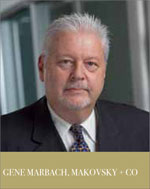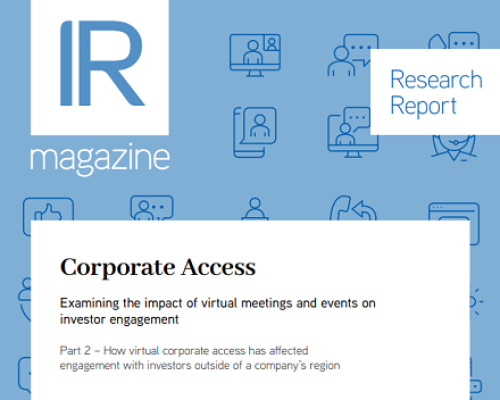Adam Piore asks whether one-on-one meetings are in danger of falling under regulatory scrutiny
It’s no secret US securities regulators have been cracking down on illegal insider trading – since 2009, at least 59 people have either pleaded guilty or been convicted at trial in the blockbuster Galleon Group scandal.
So-called expert network firms that provide insights and data to hedge funds are increasingly being targeted for providing non-public information to clients.
It seems even the US Congress is not immune: in April, President Obama signed a bill making sure politicians’ federal workersare barred from profiting from any inside information gleaned on the job.
Little wonder, then, that comments about one-on-one meetings uttered in February by David Rosenfeld, joint head of the SEC’s enforcement division in New York, caused consternation among some IR professionals and has led a number to speculate that widely held private meetings between managementand large investors might come under growing regulatory scrutiny.
Speaking at a conference sponsored by the Directors Roundtable about insider trading and securities laws, Rosenfeld reportedly called analyst days – where companies discuss corporate issues with select groups of interested parties – and one-on-one meetings ‘troubling’, and warned that a wide array of activities now commonplace in the industry put individuals at risk of violating Regulation Fair Disclosure.
‘David was frankly shocked that some of this stuff was going on, which in turn shocked me,’ one partner at a major law firm told a reporter at the time.
‘You talk to your institutional investors in the regular course of business, and I can tell you from talking to people at the SEC, David is not alone at the commission in holding these views.’
SEC: no plans for action
SEC officials insist the comments were not meant to indicate any plans to expand the definition of insider trading or securities fraud.
The comments, an SEC spokesperson tells IR magazine, were meant simply as a warning that those engaging in such activities should be careful not to violate the rules during these meetings by disclosing material non-public information.
‘There is greater potential for information to be improperly disclosed in a one-on-one situation, which is why firms are required to have internal controls and policies and to safeguard their material non-public information,’ the spokesperson points out.
Indeed, many industry players note that one-on-ones are likely to remain an important aspect of the industry for years to come. These meetings are so in demand that brokers are able to ‘sell’ meetings with CEOs and CFOs for $4,000 each at conferences and $7,500-$10,000 each at non-deal roadshows, according to a 2010 study carried out by Greenwich Associates.
One third of US equity research commissions – equating to about $4 bn in the US alone – are being used to ‘compensate’ the sell side for arranging meetings with corporate management teams.
Take precautions, experts say
By some estimates, as many as 200,000 one-on-ones take place at conferences every year. That means it’s more important than ever to take precautions to stay in compliance, a number of IR professionals say.
Attorneys generally aren’t present in one-on-ones that occur in the non-deal space, notes Adrian Rusling, a partner at Phoenix Investor Relations, the Brussels-headquartered firm that specializes in corporate access.
As a result, it is probably wise to have ‘a couple of people in the meeting’, and to maintain accurate records of the meetings. ‘You’d be surprised by the answers when you ask companies: Who are you seeing, in what context and what action has that company taken? So many don’t have good records,’ he says.
Christopher Dearborn, director of corporate access at Phoenix Partners Group in New York, argues that one-on-ones are required because earnings calls are simply insufficient to answer all investor questions given that time is finite.
‘Many people have different questions depending on their point of view,’ Dearborn explains. ‘If you have an investment thesis based on dividends, growth, value, GARP, accounting or international, your questions will vary. A company simply can’t get to all those people in an earnings call. Each investor meeting is tailored to the investor thesis of the professional who is the money manager for that group.’ This can also be more of an issue when working with start-ups and entrepreneurs, says Gene Marbach, group vice president of Makovsky + Co who works often with ‘entrepreneurial management types’. Many, he says, ‘are very exuberant about business’ and don’t know the nuances of the law.
This can also be more of an issue when working with start-ups and entrepreneurs, says Gene Marbach, group vice president of Makovsky + Co who works often with ‘entrepreneurial management types’. Many, he says, ‘are very exuberant about business’ and don’t know the nuances of the law.
‘You have to train them that there really are disclosure boundaries,’ he says. ‘We try to instill in our clients the notion that this is very much to safeguard the company’s good name – inside information will just destroy your reputation. It is up to companies to police and train their executives.’
Marbach does note, however, that one-on-ones are important to allow management to bond with shareholders and understand their needs. ‘We live in an era of transparency,’ he says.
‘In one-on-ones, non-verbal messages come across, such as how passionate management is about business, how focused it is on building relationships with the Street. There is nothing like being in a room on a one-on-one with somebody.’
Research scrutinyA study released last November found that private meetings are ‘strongly associated with the direction of trades’ and added to evidence that investors gain a significant edge from one-on-ones, potentially undermining the spirit of fair disclosure rules.Eugene Soltes of Harvard Business School and David Solomon of Marshall School of Business at the University of Southern California studied the meeting records of one mid-cap NYSE-listed company between 2004 and 2010. Over this time the company – which asked to remain anonymous – met with 340 different institutional investors and took part in 935 one-on-one meetings. ‘Overall, our results suggest private meetings help some investors make more informed trading decisions,’ the study authors write. In May last year, in a study of 400 investors and analysts from around the world carried out by PwC and the Rotterdam School of Management, 47 percent of respondents said they intentionally or unintentionally received material information in one-on-one meetings. |










